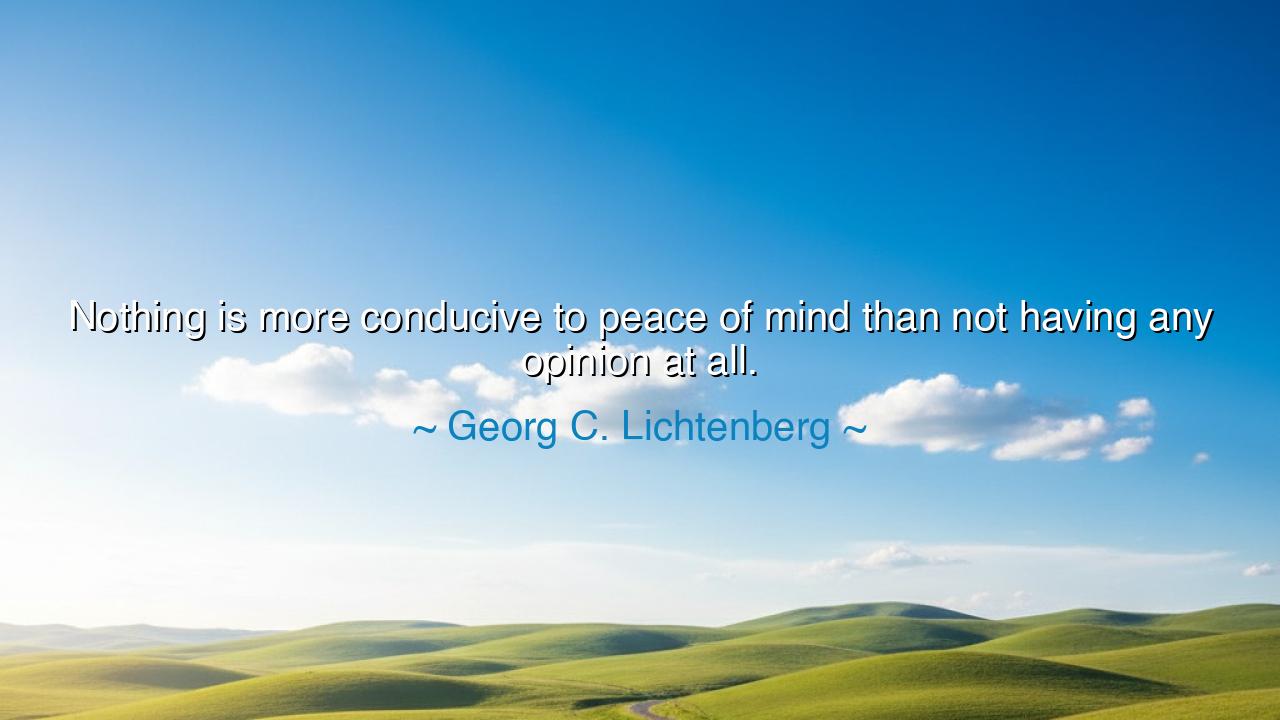
Nothing is more conducive to peace of mind than not having any






Georg C. Lichtenberg, the German sage of wit and paradox, spoke a truth that pierces through the noise of every age: “Nothing is more conducive to peace of mind than not having any opinion at all.” At first glance, these words may seem strange, even dangerous, for do we not live and breathe by our thoughts and judgments? Yet Lichtenberg whispers to us a hidden wisdom: that the endless turmoil of the mind comes not from what is, but from what we insist on declaring about what is. Opinions cling to us like chains, and in clinging, they drag us into quarrels, into pride, into endless unrest.
The ancients knew this well. The Stoics taught that serenity is found not in shaping the world to our will, but in freeing our souls from needless disturbance. Epictetus would remind his disciples that much of human suffering comes not from events themselves, but from the judgments we cast upon them. The man who insists, “This is good, this is evil, this must be as I believe,” finds his soul tossed upon waves of anger, disappointment, and pride. But the man who allows events to be as they are, without binding himself to harsh opinions, dwells in calm waters. Thus, Lichtenberg’s words stand as an echo of Stoic stillness: when we cast away unnecessary opinions, we step closer to true peace.
Consider the tragedy of religious wars in Europe, when armies marched and nations bled over disputes of doctrine, each side crying that it alone held the truth. Millions perished, not because bread was scarce or water was poisoned, but because men would not release their grip on their opinions. And yet, when the Peace of Westphalia was finally signed in 1648, weary of endless blood, rulers agreed not to erase one another’s beliefs, but to let them be. The silence of swords that followed was not the triumph of one opinion over another, but the recognition that peace dwells where opinions no longer rule with iron fists.
We see the same spirit in the life of the Buddha, who taught the Middle Way. He warned his followers not to cling too tightly even to his own teachings, for the clinging mind, burdened by rigid opinions, cannot find enlightenment. Only when one lays down the weight of constant judgment can the heart rest in compassion and clarity. The Buddha did not call for ignorance, but for freedom from the restless need to impose our thoughts upon all things. In this way, peace of mind arises — not from the absence of truth, but from the release of attachment.
Children of tomorrow, understand this: not every matter requires your opinion. The world will tempt you with endless debates, pulling you into anger over affairs too vast or too trivial. Ask yourself, Must I judge this? Must I weigh in on all things? Often, the answer is no. By refusing to be enslaved by every argument, you free your soul to dwell in harmony. To let go is not weakness, but strength. To be silent when others clamor is not ignorance, but wisdom.
The lesson, therefore, is plain: guard your peace of mind by guarding your tongue and your thoughts. Speak when justice demands it, yes — for silence in the face of cruelty is no virtue. But in the thousand lesser matters, learn the art of letting go. Walk away from petty disputes, refrain from binding yourself to judgments that serve no good, and do not let the storms of others rob you of inner calm. For the world will always rage, but you need not rage with it.
Practical action flows from this truth: each day, choose one matter that tempts you to needless judgment, and release it. When others quarrel, practice the discipline of listening without adding fuel. When news or gossip arrives, resist the urge to form a hasty opinion. Instead, breathe, observe, and let stillness guide you. In time, you will discover what Lichtenberg proclaimed: that to live free of unnecessary judgment is to taste the rare sweetness of peace.
Thus let it be remembered: nothing is more conducive to peace of mind than not having any opinion at all. For the mind without chains of judgment rests serene like a mountain in the wind — unshaken, immovable, and eternal. And those who learn this art carry within them a fortress no storm can breach.






AAdministratorAdministrator
Welcome, honored guests. Please leave a comment, we will respond soon